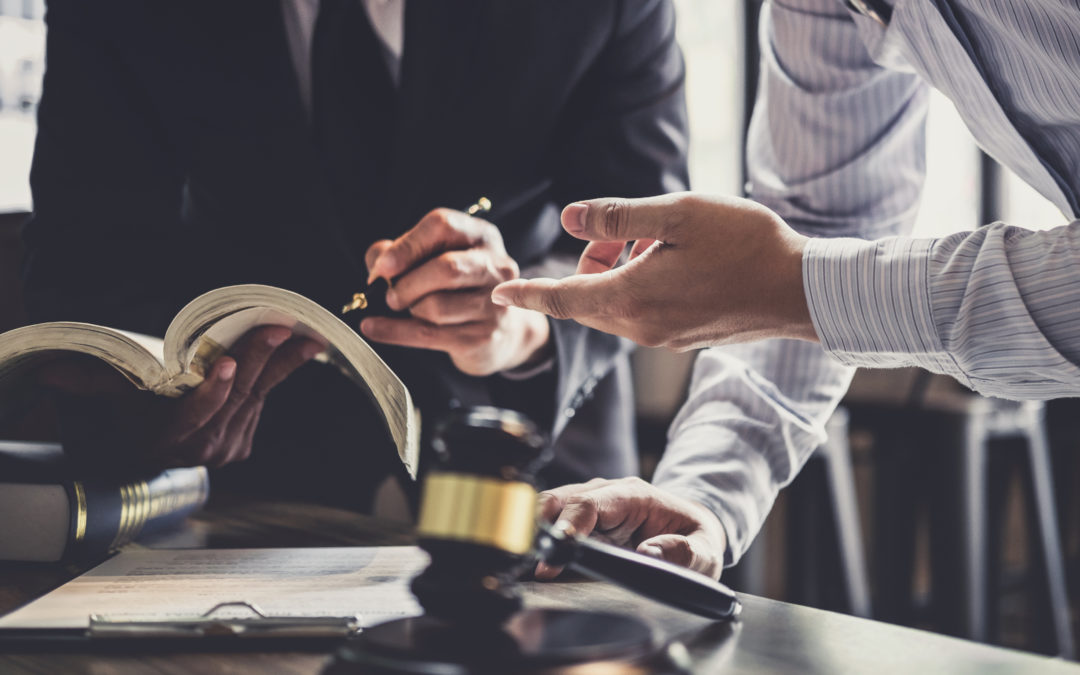YOU’RE GOING TO TRIAL: WHAT DOES THAT MEAN?
Most civil lawsuits end with a settlement. There is no trial. There are, nevertheless, some cases that do go to trial. For the litigants, however, “going to trial” is a nebulous subject. This article will discuss what it means to go to trial in a civil matter.
What Is A Trial
In the simplest terms, a trial is a formal presentation of evidence for the purpose of having a third party finder of fact – a judge or jury – make a decision, in the form of a judgment. Whether the trial is held before a judge or a jury, depends on various factors including the applicable law and the decisions of the parties. For example, if an issue is an issue of law, (e.g. what a contract means or how to interpret a statute), is tried before a judge. Where there is an issue of fact to be decided (e.g. whether a contract has been breached or whether someone has been negligent, etc.), the parties have the option to request a jury or allow a judge to decide the case. Regardless of who the finder of fact may be, the trial will be a presentation of evidence and legal argument leaving the judge or a jury to decide the outcome.
Steps to Prepare for Trial
Prior to trial, the parties generally have several months to obtain information about the other sides’ case, through either a voluntary exchange of information or formal discovery. Information from parties can be obtained by written discovery and depositions, while subpoenas can be used to obtain information from third parties. Generally, discovery is stopped at least 30 days before trial so the parties can analyze the evidence and try to settle or use the evidence obtained during discovery to prepare for trial. Many clients believe that once discovery is completed the work for the case is essentially completed. That is not, however, correct. As is summarized below, once the discovery phase is complete, significant work remains to prepare for trial.
• Review all discovery to determine what evidence and deposition testimony may be used at trial.
• Serve subpoenas to compel witnesses to testify or to produce documents for trial.
• Complete expert depositions to determine what opinions the experts may testify to at trial (experts are normally disclosed fifty days before trial and are deposed shortly thereafter).
• Complete research on any issues that will be determined at trial. In this regard, issues are often raised during the discovery process are not researched until after discovery closes due to the press of other business. Where these issues will have to be determined by a judge, instead of a jury, parties will need to complete legal research so that they can present their best arguments to the court.
• Prepare pre-trial motions. Prior to trial, a party that wishes to exclude evidence can bring a motion to exclude evidence known as a “Motion in Limine.” In addition, a party may prepare a pre-trial motion that seeks the dismissal of the action or the granting of a judgment in favor of the party.
• Prepare a witness list and prepare the witnesses. During the course of discovery, witnesses to the events will usually be disclosed and then deposed. For all witnesses who may testify, a pre-trial interview is usually conducted so the witnesses may be prepared before their testimony to make sure they are familiar with the court process, understand the theories of your case and testify in a truthful and straight forward manner that is best to your case.
• Prepare a trial brief. Although trial briefs are only required in non-jury trials, most experienced attorneys prepare a trial brief that outlines the parties to the case, the facts of the case as well as the legal issues that may arise during trial to provide the court with a roadmap of what to expect. Trial briefs are often the party’s only opportunity to explain their case to a trial judge, which is especially important if your trial judge is not the same judge that oversaw the case through the discovery phase.
• Prepare an exhibit list and trial binders. During discovery, numerous documents are exchanged, some of which will be used as exhibits. The trial attorney will need to determine which documents will be used as exhibits and prepare an exhibit list to inform the court of what exhibits may be introduced at trial. Most courts also require counsel for the parties to meet and confer regarding the exhibits and make an effort to resolve any issues related to admissibility and identify those problematic exhibits that require a ruling by the court. The meet and confer process is intended to save trial time.
• Prepare deposition summaries and witness and outlines. For each witness, the experienced trial lawyer will prepare an outline of questions that may be asked and tie the questions to any related exhibits. This is true whether the attorney is conducting direct or cross-examination. For hostile witnesses, the outline requires citations to deposition testimony and other evidence that can be used if the witness attempts to change his or her prior testimony or contradict testimony of another witness. Although the process is time consuming and costly, having the information immediately available makes for much more effective cross examination.
• Prepare a neutral statement, jury instructions and proposed verdict form. If the case will be tried before a jury, the attorneys will meet and confer, and submit a joint neutral statement of the case that will be read to the jury. In addition, the attorneys need to provide the court with proposed jury instructions and well as a proposed verdict.
• Prepare demonstrative exhibits and outlines. In addition to the actual exhibits, judges and juries are aided by demonstrative exhibits including power point presentations and summaries of the evidence that can be displayed in graphic form. Even blow ups of certain jury instructions and the verdict form are helpful to provide to the jury. Summaries can also be used in connection with opening and closing statements. As a practical matter, juries expect to be “entertained” as well as educated as part of the trial process. Meeting the expectations of the jury can be critical to success.
Conclusion
As can be seen, preparing for trial requires significant work. Both parties can anticipate that for each day of trial, 1 to 3 days of preparation will be needed, if not more. In addition, for all but the simplest trials one or more attorneys may need to be present to be sure that the trial proceeds smoothly. The cost for a 5 day jury trial can easily top $75,000. It is important to keep these costs in mind as you are evaluating settlement in determining whether to proceed to trial. Trial is not merely a quick review of what has already transpired in the case. It requires significant work.
If you have any questions regarding an upcoming trial, please feel free to call the trials attorneys at the firm or David Weiland, head of the firm’s litigation department at (559) 248-4820 or dweiland@ch-law.com.
 This article was written by Darryl J. Horowitt. Darryl is the managing partner at Coleman & Horowitt, LLP, where he works in the firm’s litigation department and represents clients in complex business, construction, banking and real estate litigation, consumer finance litigation, commercial collections, casualty insurance defense, insurance coverage, and alternative dispute resolution. He has been named a Northern California Super Lawyer® (Thomson Reuters) in business litigation from 2006-2020, a Top 100 Northern California Super Lawyer® (Thomson Reuters) from 2015-2019, has received an AV®-Preeminent rating from Martindale-Hubbell and a perfect 10.0 rating from Avvo. He is a member of the Fresno County, Los Angeles County and American Bar Associations, the Association of Business Trial Lawyers (former President and Board Member). Darryl can be reached at dhorowitt@ch-law.com or (559) 248-4820, ext. 111.
This article was written by Darryl J. Horowitt. Darryl is the managing partner at Coleman & Horowitt, LLP, where he works in the firm’s litigation department and represents clients in complex business, construction, banking and real estate litigation, consumer finance litigation, commercial collections, casualty insurance defense, insurance coverage, and alternative dispute resolution. He has been named a Northern California Super Lawyer® (Thomson Reuters) in business litigation from 2006-2020, a Top 100 Northern California Super Lawyer® (Thomson Reuters) from 2015-2019, has received an AV®-Preeminent rating from Martindale-Hubbell and a perfect 10.0 rating from Avvo. He is a member of the Fresno County, Los Angeles County and American Bar Associations, the Association of Business Trial Lawyers (former President and Board Member). Darryl can be reached at dhorowitt@ch-law.com or (559) 248-4820, ext. 111.
Established in 1994, Coleman & Horowitt is a state-wide law firm focused on delivering responsive and value driven service and preventive law. The firm represents businesses and their owners in matters involving transactions, litigation, agriculture and environmental regulation and litigation, intellectual property, real estate, estate planning and probate.
The Firm has been recognized as a “Top Law Firm” (Martindale Hubbell) and a “Go-To” Law Firm (Corporate Counsel). From six offices in California, and the Firm’s membership in Primerus, a national and international society of highly rated law firms (www.primerus.com), the Firm has helped individuals and businesses solve their most difficult legal problems. For more information, see www.ch-law.com and www.Primerus.com.
Disclaimer: This article is intended to provide the reader with general information regarding current legal issues. It is not to be construed as specific legal advice or as a substitute for the need to seek competent legal advice on specific legal matters. This publication is not meant to serve as a solicitation of business. To the extent that this may be considered as advertising, then it is expressly identified as such.

